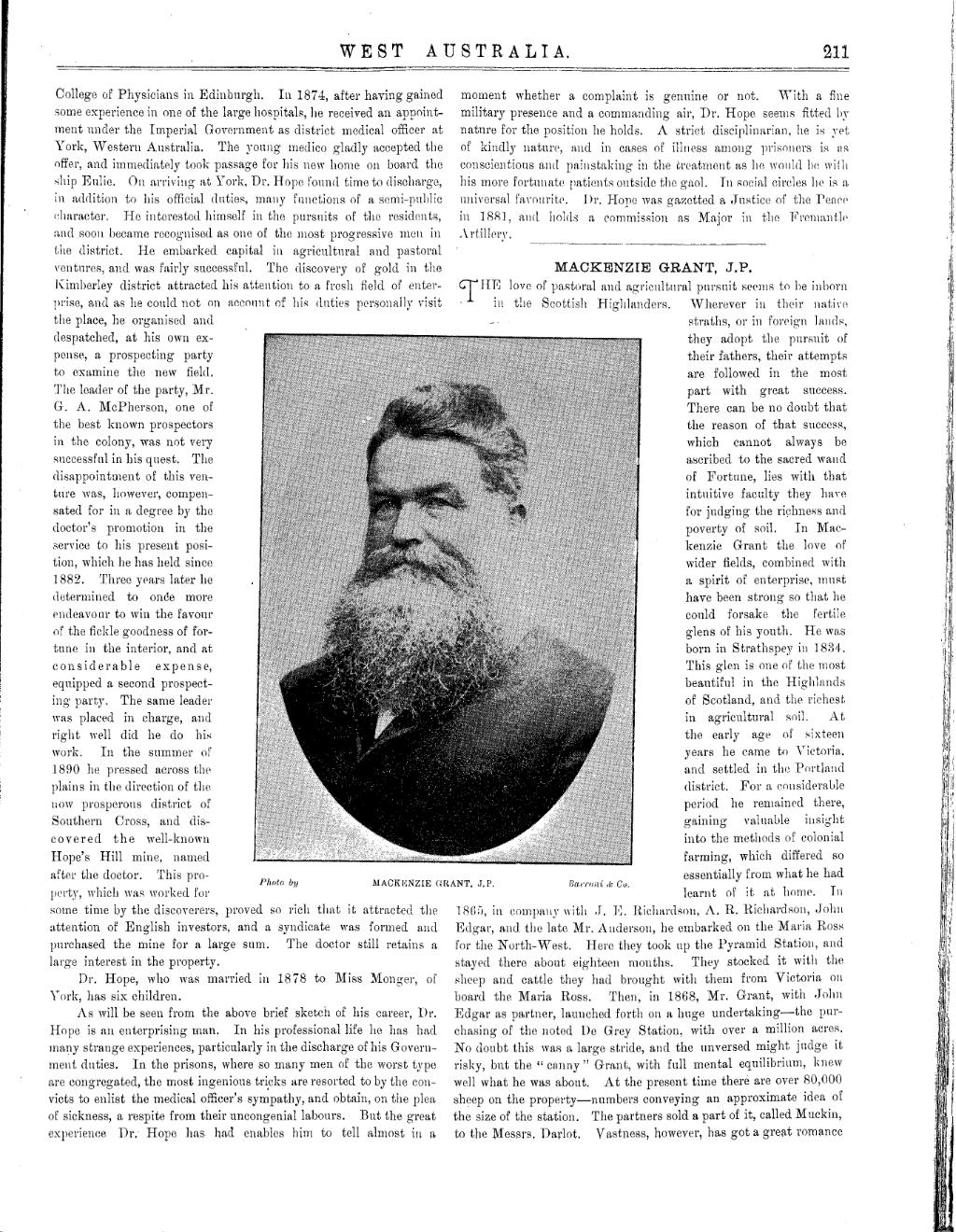College of Physicians in Edinburgh. In 1874, after having gained some experience in one of the large hospitals, he received an appointment under the Imperial Government as district medical officer at York, Western Australia. The young medico gladly accepted the offer, and immediately took passage for his new home on board the ship Eulie. On arriving at York, Dr. Hope found time to discharge, in addition to his official duties, many functions of a semi-public character. He interested himself in the pursuits of the residents, and soon became recognised as one of the most progressive men in the district. He embarked capital in agricultural and pastoral ventures, and was fairly successful. The discovery of gold in the Kimberley district attracted his attention to a fresh field of enterprise, and as he could not on account of his duties personally visit the place, he organised and despatched, at his own expense, a prospecting party to examine the new field. The leader of the party, Mr. G. A. McPherson, one of the best known prospectors in the colony, was not very successful in his quest. The disappointment or this venture was, however, compensated for in a degree by the doctor's promotion in the service to his present position, which he has held since 1882. Three years later he determined to once more endeavour to win the favour or the fickle goodness of fortune in the interior, and at considerable expense, equipped a second prospecting party. The same leader was placed in charge, and right well did he do his work. In the summer of 1890 he pressed across the plains in the direction of the now prosperous district of Southern Cross, and discovered the well-known Hope's Hill mine, named after the doctor. This property, which was worked for some time by the discoverers, proved so rich that it attracted the attention of English investors, and a syndicate was formed and purchased the mine for a large sum. The doctor still retains a large interest in the property.
Dr. Hope, who was married in 1878 to Miss Monger, of York, has six children.
As will be seen from the above brief sketch of his career, Dr. Hope is an enterprising man. In his professional life he has had many strange experiences, particularly in the discharge of his Government duties. In the prisons, where so many men of the worst type are congregated, the most ingenious tricks are resorted to by the convicts to enlist the medical officer's sympathy, and obtain, on the plea of sickness, a respite from their uncongenial labours. But the great experience Dr. Hope has had enables him to tell almost in a moment whether a complaint is genuine or not. With a fine military presence and a commanding air, Dr. Hope seems fitted by nature for the position he holds. A strict disciplinarian, he is yet of kindly nature, and in cases of illness among prisoners is as conscientious and painstaking in the treatment as he would be with his more fortunate patients outside the gaol. In social circles he is a universal favourite. Dr. Hope was gazetted a Justice of the Peace in 1881, and holds a commission as Major in the Fremantle Artillery.
MACKENZIE GRANT, J.P.
 |
Photo by MACKENZIE GRANT. Barroni & Co. |
THE love of pastoral and agricultural pursuit seems to be inborn in the Scottish Highlanders. Wherever in their native straths, or in foreign lands, they adopt the pursuit of their fathers, their attempts are followed in the most part with great success. There can be no doubt that the reason of that success, which cannot always be ascribed to the sacred wand of Fortune, lies with that intuitive faculty they have for judging the richness and poverty of soil. In Mackenzie Grant the love of wider fields, combined with a spirit of enterprise, must have been strong so that he could forsake the fertile glens of his youth. He was born in Strathspey in 1834. This glen is one of the most beautiful in the Highlands of Scotland, and the richest in agricultural soil. At the early age of sixteen years he came to Victoria, and settled in the Portland district. For a considerable period he remained there, gaining valuable insight into the methods of colonial farming, which differed so essentially from what he had learnt of it at home. In 1896, in company with J. E. Richardson, A. R. Richardson, John Edgar, and the late Mr. Anderson, he embarked on the Maria Ross for the North-West. Here they took up the Pyramid Station, and stayed there about eighteen months. They stocked it with the sheep and cattle they had brought with them from Victoria on board the Maria Ross. Then, in 1868, Mr. Grant, with John Edgar as partner, launched forth on a huge undertaking—the purchasing of the noted De Grey Station, with over a million acres. No doubt this was a large stride, and the unversed might judge it risky, but the "canny" Grant, with full mental equilibrium, knew well what he was about. At the present time there are over 80,000 sheep on the property—numbers conveying an approximate idea of the size of the station. The partners sold a part of it, called Muckin, to the Messrs. Darlot. Vastness, however, has got a great romance
